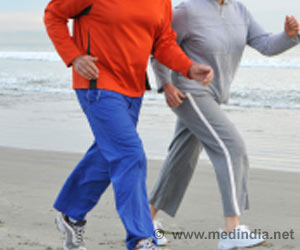- Study suggests that walking speed of middle-aged individuals could act as a predictor for risk of heart disease.
- The findings show that men and women who reported slow walking showed a 2-fold increase in cardiovascular mortality risk compared with those who reported brisk walking.
- Self-reported walking pace might be able to differentiate between healthy and unhealthy body mass index (BMI).
Physical fitness and cardiovascular health: Physical fitness is a state of health and well-being that allows an individual to perform physical activities. In case of heart related fitness, cardiorespiratory fitness is the most extensively studied due to its relation with mortality risk. Cardiorespiratory fitness is the ability of the body’s circulatory and respiratory systems to supply fuel or energy during long periods of physical activity. Studies have shown that cardiorespiratory fitness is inversely related to cardiovascular mortality. This means that low cardiorespiratory fitness correlates with higher chances of heart related deaths. It also poses as an efficient risk predictor when compared to the convention risk factors like blood pressure, smoking, cholesterol, diabetes and age.
Although measuring cardiorespiratory fitness is a good predictor of heart health, clinical practice is limited as it is time consuming and requires special equipment and resources. This makes it necessary to develop other easy to administer techniques to measure cardiorespiratory fitness and ultimately heart health.
This study was conducted on 420,727 middle-aged men and women across UK. The data was collected between 2006 and 2010 and analyzed by the UK Biobank. It was ensured that at the time of collection all participants were free from cancer and heart diseases. The participants were followed for a period of 6 years after data collection and in that time there were 8598 deaths; 4850 due to cancer and 1654 due to cardiovascular diseases.
Professor Tom Yates, Principal Investigator for the study, said: “Our study was interested in the links between whether someone said they walked at a slow, steady or brisk pace and whether that could predict their risk of dying from heart disease or cancer in the future.”
Researchers investigated the association of self-reported walking speed and handgrip strength to mortality risk due to heart diseases. The participants were asked to report their walking pace as slow, steady/moderate or brisk.
- Men and women who reported slower walking speeds showed a two fold increase in cardiovascular mortality risk compared to those who reported brisk walking.
- Self-reported walking pace might be able to differentiate between healthy and unhealthy BMI. However, this need not be true as participants with lower BMIs may report slower walking pace due to other diseases or illness.
- Handgrip strength was not associated with cardiovascular mortality in women but men in the lowest group of handgrip strength had 44% higher risk of cardiovascular mortality. However, the study concluded that this was a weak predictor of heart-related health and does not apply across the population.
Reference:
- Grøntved, A., & Hu, F. B. (2017). Walking pace and handgrip strength: simple measures of fitness and mortality risk? European Heart Journal.doi:10.1093/eurheartj/ehx497
Source-Medindia
















